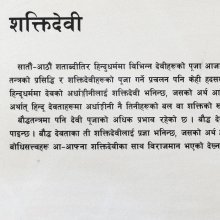Adhika: 22 definitions
Introduction:
Adhika means something in Buddhism, Pali, Hinduism, Sanskrit, Jainism, Prakrit, the history of ancient India, Marathi, Hindi. If you want to know the exact meaning, history, etymology or English translation of this term then check out the descriptions on this page. Add your comment or reference to a book if you want to contribute to this summary article.
Images (photo gallery)
In Hinduism
Vyakarana (Sanskrit grammar)
Source: Wikisource: A dictionary of Sanskrit grammar1) Adhika (अधिक).—Additional or surplus activity which a rule in grammar sometimes shows; अधिकः कारः (adhikaḥ kāraḥ) or अधिकं कार्यम् (adhikaṃ kāryam); cf. M. Bh. on I.3.11, Kāś. on III.2.124, Bh. Vṛ. on III.4.72;
2) Adhika.—Surplus subject matter e. g. अथाख्याः समाम्नायाधिकाः प्राग्रिफितात् (athākhyāḥ samāmnāyādhikāḥ prāgriphitāt) (V.Pr. I.33.)

Vyakarana (व्याकरण, vyākaraṇa) refers to Sanskrit grammar and represents one of the six additional sciences (vedanga) to be studied along with the Vedas. Vyakarana concerns itself with the rules of Sanskrit grammar and linguistic analysis in order to establish the correct context of words and sentences.
Kavyashastra (science of poetry)
Source: Shodhganga: The Kavyavilasa of Ciranjiva Bhattacarya (kavyashastra)Adhika (अधिक) refers to one of the 93 alaṃkāras (“figures of speech”) mentioned by Cirañjīva Bhaṭṭācārya (fl. 17th century) in his Kāvyavilāsa and is listed as one of the 89 arthālaṃkāras (figure of speech determined by the sense, as opposed to sound).—Among the ancient Ālaṃkārikas only Rudraṭa has admitted this figure adhika. Mammaṭa in his Kāvyaprakāśa, has dealt with this figure adhika. Ruyyaka (A.S. P. 134) makes a precise and lucide definition.
According to Cirañjīva when of the two the container and the thing contained the latter one is described as vaster than the former the figure adhika emerges—“adhikaṃ tvadhikādhārādādheyādhikyavarṇane”.—In this world usually the thing contained becomes smaller and the container becomes vaster. The container may incorporate within itself so many big things, but in the case of this figure the thing contained becomes vaster than the container.
Example of the adhika-alaṃkāra:—
asti brahmāṇḍabhānḍaṃ hi yasmillokāścaturdaśa |
tasminnapi na te bhāti kīrtirjagati kīrtita ||“Oh! Praised in the world! There is the container in the form of universe in which the fourteen worlds are contained, even in this container your fame is not contained”.
Notes: This verse is taken from Kalpalata, composed by the author himself which is now lost. In this verse it is said that this universe is such a vast thing that fourteen worlds are contained in it. But even in this universe the fame of the king is not contained. It spreads surpassing the whole universe. Here the universe is the container and the fame of the king is contained. Here the exceeding of the fame is described, so it is an example of adhika.

Kavyashastra (काव्यशास्त्र, kāvyaśāstra) refers to the ancient Indian tradition of poetry (kavya). Canonical literature (shastra) of the includes encyclopedic manuals dealing with prosody, rhetoric and various other guidelines serving to teach the poet how to compose literature.
Vaishnavism (Vaishava dharma)
Source: Pure Bhakti: Arcana-dipika - 3rd EditionAdhika (अधिक) refers to one of the months (māsa) in the Vedic calendar.—There are twelve months in a Vedic lunar calendar, and approximately every three years, there is a thirteenth month. Each month has a predominating deity and approximately corresponds with the solar christian months. [...] In accordance with the month of the year, one would utter the Vedic month, for example, adhika-māsi.
The presiding deity of Adhika is Puruṣottama .

Vaishnava (वैष्णव, vaiṣṇava) or vaishnavism (vaiṣṇavism) represents a tradition of Hinduism worshipping Vishnu as the supreme Lord. Similar to the Shaktism and Shaivism traditions, Vaishnavism also developed as an individual movement, famous for its exposition of the dashavatara (‘ten avatars of Vishnu’).
In Buddhism
Buddhist philosophy
Source: Google Books: A History of Indian Logic (Buddhist Philosophy)Adhika (अधिक) refers to “saying too much” and represents one of the various “points of defeat” (nigrahasthāna), according to Upāyakauśalyahṛdaya, an ancient work on the art of debate composed by Bodhisattva Nāgārjuna.
-
In Jainism
General definition (in Jainism)
Source: archive.org: Een Kritische Studie Van Svayambhūdeva’s PaümacariuAdhika (अधिक) participated in the war between Rāma and Rāvaṇa, on the side of the latter, as mentioned in Svayambhūdeva’s Paumacariu (Padmacarita, Paumacariya or Rāmāyaṇapurāṇa) chapter 57ff. Svayambhū or Svayambhūdeva (8th or 9th century) was a Jain householder who probably lived in Karnataka. His work recounts the popular Rāma story as known from the older work Rāmāyaṇa (written by Vālmīki). Various chapters [mentioning Adhika] are dedicated to the humongous battle whose armies (known as akṣauhiṇīs) consisted of millions of soldiers, horses and elephants, etc.

Jainism is an Indian religion of Dharma whose doctrine revolves around harmlessness (ahimsa) towards every living being. The two major branches (Digambara and Svetambara) of Jainism stimulate self-control (or, shramana, ‘self-reliance’) and spiritual development through a path of peace for the soul to progess to the ultimate goal.
India history and geography
Source: Cologne Digital Sanskrit Dictionaries: Indian Epigraphical GlossaryAdhika.—(EI 3), intercalary [month]. Note: adhika is defined in the “Indian epigraphical glossary” as it can be found on ancient inscriptions commonly written in Sanskrit, Prakrit or Dravidian languages.

The history of India traces the identification of countries, villages, towns and other regions of India, as well as mythology, zoology, royal dynasties, rulers, tribes, local festivities and traditions and regional languages. Ancient India enjoyed religious freedom and encourages the path of Dharma, a concept common to Buddhism, Hinduism, and Jainism.
Languages of India and abroad
Pali-English dictionary
Source: BuddhaSasana: Concise Pali-English Dictionaryadhika : (adj.) exceeding; superior.
Source: Sutta: The Pali Text Society's Pali-English DictionaryAdhika, (adj.) (fr. adhi; cp. Sk. adhika) exceeding, extraordinary, superior, Pug.35; VvA.80 (= anadhivara, visiṭṭha); DA.I, 141, 222; Dpvs.V, 32 (an°); DhA.III, 238; KhA 193 (= anuttara); Sdhp.337, 447. — compar. adhikatara DhA.II, 7; III, 176; nt. °ṃ as adv. extraordinarily PvA.86 (= adhimattaṃ). In combn. with numerals adhika has the meaning of “in addition, with an additional, plus” (cp. ādi + ādika, with which it is evidently confounded, adhika being constructed in the same way as ādika, i. e. preceding the noun-determination), e. g. catunahutâdhikāni dve yojana-sahassāni 2000 + 94 (= 294 000) J.I, 25; sattamāsâdhikāni sattavassāni 7 years and 7 months J.V, 319; paññāsâdhikāni pañca vassa-satani 500 + 50 (= 550) PvA.152. See also sâdhika. (Page 27)

Pali is the language of the Tipiṭaka, which is the sacred canon of Theravāda Buddhism and contains much of the Buddha’s speech. Closeley related to Sanskrit, both languages are used interchangeably between religions.
Marathi-English dictionary
Source: DDSA: The Molesworth Marathi and English Dictionaryadhika (अधिक).—a (S) More. 2 Greater or larger. 3 Additional or supernumerary;--used of the intercalary month occurring every two and a half years. 4 Above, beyond, exceeding, surpassing. Also in comp.: as guṇādhika Of superior merit or worth; of higher excellencies or qualities; rasādhika Of finer taste or flavor; of surpassing pathos or sentiment. 5 In comp. with numerals as the middle member of the compound. Augmented by: as ēkādhikaśata A hundred and one; pañcādhika-śata-sahastra-lakṣa- &c. 6 Preëminent or extraordinary, in a bad sense; i.e. wild, wilful, mischievous--a child.
Source: DDSA: The Aryabhusan school dictionary, Marathi-Englishadhika (अधिक).—a More, greater. Above.
Marathi is an Indo-European language having over 70 million native speakers people in (predominantly) Maharashtra India. Marathi, like many other Indo-Aryan languages, evolved from early forms of Prakrit, which itself is a subset of Sanskrit, one of the most ancient languages of the world.
Sanskrit dictionary
Source: DDSA: The practical Sanskrit-English dictionaryAdhika (अधिक).—a. [abbreviation of adhyārūḍha; adhyārūḍhaśabdāt kan uttarapadalopaśca P.V.2.73].
1) More, additional, greater (opp. ūna or sama); तदस्मिन्नधिकम् (tadasminnadhikam) P.V.2.45. (In comp. with numerals) plus, greater by; अष्टाधिकं शतम् (aṣṭādhikaṃ śatam) 1 plus 8 = 18; चत्वारिंशतोऽधिकाः (catvāriṃśato'dhikāḥ) = °चत्वारिंशाः (catvāriṃśāḥ) more than 4; नवाधिकां नवतिम् (navādhikāṃ navatim) R.3.69; एकाधिकं हरेज्जयेष्टः (ekādhikaṃ harejjayeṣṭaḥ) Manusmṛti 9.117.
2) (a) Surpassing in quantity, more numerous, copious, excessive, abundant; in comp. or with instr.; श्वासः प्रमाणाधिकः (śvāsaḥ pramāṇādhikaḥ) Ś.1.29. more than the usual measure. (b) Inordinate, grown, increased, become greater; abounding in, full of; strong in; °क्रोध (krodha) R.12.9; वयोऽधिकः (vayo'dhikaḥ) Manusmṛti 4.141 senior in years; शिशुरधिकवयाः (śiśuradhikavayāḥ) Ve.3.32. old, advanced in years; भवनेषु रसाधिकेषु (bhavaneṣu rasādhikeṣu) v. l. (sudhāriteṣu) पूर्वं (pūrvaṃ) Ś.7.2; करोति रागं हृदि कौतुकाधिकं (karoti rāgaṃ hṛdi kautukādhikaṃ) K.2.; रसाधिके मनसि (rasādhike manasi) Śiśupālavadha 17.48 abounding in.
3) (a) More, greater, stronger, mightier, more violent or intense; अधिकां कुरु देवि गुरुभक्तिम् (adhikāṃ kuru devi gurubhaktim) K.62; ऊनं न सत्त्वेष्वधिको बबाधे (ūnaṃ na sattveṣvadhiko babādhe) R.2.14 the stronger animal did not prey on the weaker; पुमान्पुंसोऽधिके शुक्रे स्त्री भवत्यधिके स्त्रियाः (pumānpuṃso'dhike śukre strī bhavatyadhike striyāḥ) Manusmṛti 3.49; अधिकं मेनिरे विष्णुम् (adhikaṃ menire viṣṇum) Rām.; अधिकं मित्रम् (adhikaṃ mitram) Pañcatantra (Bombay) 2; यवीयान्गुणतोऽधिकः (yavīyānguṇato'dhikaḥ) Manusmṛti 11.185;9.154. (b) Superior to, better than; higher than [with abl. or in comp.); प्रमाणादधिकस्यापि मत्तदन्तिनः (pramāṇādadhikasyāpi mattadantinaḥ) Pañcatantra (Bombay) 1.327; सेनाशते- भ्योऽधिका बुद्धिः (senāśate- bhyo'dhikā buddhiḥ) Mu.1.27 surpassing, more than a match for &c.; विधेरधिकसंभारः (vidheradhikasaṃbhāraḥ) R.15.62 more than what was sanctioned by rules; तपस्विभ्योऽधिको योगी (tapasvibhyo'dhiko yogī) Bhagavadgītā (Bombay) 6.46; ब्रह्म प्रदानेभ्योऽधिकम् (brahma pradānebhyo'dhikam) Y.1.212; अश्वाधिको राजा (aśvādhiko rājā) H.3.77 strong in cavalry; धनधान्याधिको वैश्यः (dhanadhānyādhiko vaiśyaḥ) H.4.21 excels in, is superior by reason of; लोकाधिकं तेजः (lokādhikaṃ tejaḥ) Mu.4.1 superior to; sometimes with gen.; पञ्चदशानां भ्रातणामधिको गुणैः (pañcadaśānāṃ bhrātaṇāmadhiko guṇaiḥ) K.136.
4) Later, subsequent, further than (of time); राजन्य- बन्धोर्द्वाविंशे (rājanya- bandhordvāviṃśe) (keśānto vidhīyate) वैश्यस्य द्वयधिके ततः (vaiśyasya dvayadhike tataḥ) Manusmṛti 2.65.2 years later i. e. in the 24th year; sometimes with gen.; ममाधिका वा तुल्या वा (mamādhikā vā tulyā vā) Rām.
5) Eminent, uncommon, special, peculiar (asādhāraṇa); विद्या नाम नरस्य रूपमधिकम् (vidyā nāma narasya rūpamadhikam) Bhartṛhari 2.2 superior or uncommon form or beauty; धर्मो हि तेषामधिको विशेषः (dharmo hi teṣāmadhiko viśeṣaḥ) H. Pr.25; इज्याध्ययनदानानि वैश्यस्य क्षत्रियस्य च । प्रतिग्रहोऽधिको विप्रे याजनाध्यनापने तथा (ijyādhyayanadānāni vaiśyasya kṣatriyasya ca | pratigraho'dhiko vipre yājanādhyanāpane tathā) || Y.1.118; sometimes used in the comparative in the above senses; क्लेशोऽधिकतरस्तेषाम् (kleśo'dhikatarasteṣām) Bhagavadgītā (Bombay) 12.5; °तरमिदानीं राजते राजलक्ष्मीः (taramidānīṃ rājate rājalakṣmīḥ) V. 5.22; स्वर्गादधिकतरं निर्वृत्तिस्थानम् (svargādadhikataraṃ nirvṛttisthānam) Ś.7.
6) Redundant, superfluous; °अङ्ग (aṅga) having a redundant limb; नोद्वहेत्कपिलां कन्यां नाधिकाङ्गीं न रोगिणीम् (nodvahetkapilāṃ kanyāṃ nādhikāṅgīṃ na rogiṇīm) Manusmṛti 3.8.
7) Intercalated, intercalary (as a month &c.)
8) Inferior, secondary.
-kam 1 Surplus, excess, more; लाभोऽधिकं फलम् (lābho'dhikaṃ phalam) Ak.
2) Abundance, redundancy, superfluity.
3) A figure of speech equivalent to hyperbole; आश्रयाश्रयिणोरेकस्याधिक्येऽधिक- मुच्यते । किमधिकमस्य ब्रूमो महिमानं वारिधेईरिर्यत्र । अज्ञात एव शेते कुक्षौ निक्षिप्य भुवनानि ॥ अत्र आश्रयस्याधिक्यम् । युगान्तकालप्रतिसंहृता- त्मनो जगन्ति यस्यां सविकाशमासत । तनौ ममुस्तत्र न कैटभद्विपस्तपो- धनाभ्यागमसंभृता मुदः (āśrayāśrayiṇorekasyādhikye'dhika- mucyate | kimadhikamasya brūmo mahimānaṃ vāridheīriryatra | ajñāta eva śete kukṣau nikṣipya bhuvanāni || atra āśrayasyādhikyam | yugāntakālapratisaṃhṛtā- tmano jaganti yasyāṃ savikāśamāsata | tanau mamustatra na kaiṭabhadvipastapo- dhanābhyāgamasaṃbhṛtā mudaḥ) || S. D; महतोर्यन्महीयांसावाश्रिताश्रययोः क्रमात् । आश्रयाश्रयिणौ स्यातां तनुत्वेऽयधिकं तु तत् (mahatoryanmahīyāṃsāvāśritāśrayayoḥ kramāt | āśrayāśrayiṇau syātāṃ tanutve'yadhikaṃ tu tat) || K. P.1. -adv.
1) More, in a greater degree; स राज्यं गुरुणा दत्तं प्रतिपद्याधिकं बभौ (sa rājyaṃ guruṇā dattaṃ pratipadyādhikaṃ babhau) R.4.1; shone the more; 3.18; यस्मिन्नैवा- धिकं चक्षुरारोपयति पार्थिवः (yasminnaivā- dhikaṃ cakṣurāropayati pārthivaḥ) Pañcatantra (Bombay) 1.243; oft. in comp.; इयम- धिकमनोज्ञा (iyama- dhikamanojñā) Ś.1.2; °सुरभि (surabhi) Meghadūta 21.
2) Exceedingly, too much.
Source: Cologne Digital Sanskrit Dictionaries: Shabda-Sagara Sanskrit-English DictionaryAdhika (अधिक).—mfn.
(-kaḥ-kā-kaṃ) Exceeding, more, over, more than, in addition to. n.
(-kaṃ) A figure in rhetoric, (Hyperbole.) E. adhi and ka, from kai to sound.
Source: Cologne Digital Sanskrit Dictionaries: Benfey Sanskrit-English DictionaryAdhika (अधिक).—[adhi + ka], adj. 1. Exceeding, [Mānavadharmaśāstra] 3, 49; greater, [Rāmāyaṇa] 4, 9, 9 stronger, [Pañcatantra] ii. [distich] 29; more than, with the abl., [Mānavadharmaśāstra] 9, 154; higher than, with the abl., [Bhagavadgītā, (ed. Schlegel.)] 6, 46; dearer, [Rāmāyaṇa] 2, 45, 32, Gorr. 2. Surpassing, [Mānavadharmaśāstra] 11, 185; chief, [Hitopadeśa] pr. [distich] 48; highest, [Bhartṛhari, (ed. Bohlen.)] 2, 17. 3. Having an addition, adhikaṃ māsam, ‘a month and more,’ [Rāmāyaṇa] 3, 15, 27. 4. Too much, [Rāmāyaṇa] 6, 16, 78.
— acc. sing. kam, adv. 1. Much, exceedingly. 2. More; with the abl., [Rājataraṅgiṇī] 5, 419. Comparat. adhika + tara, Better than, [Śākuntala, (ed. Böhtlingk.)] 100, 17.
Source: Cologne Digital Sanskrit Dictionaries: Cappeller Sanskrit-English DictionaryAdhika (अधिक).—[adjective] exceeding, extraordinary; superior, more, better than ([ablative], [instrumental], [genetive], or —°), by ([instrumental] or —°). °— and [neuter] [adverb]; [abstract] = [neuter], also tā [feminine] tva [neuter]
Source: Cologne Digital Sanskrit Dictionaries: Monier-Williams Sanskrit-English Dictionary1) Adhika (अधिक):—[from adhi] mfn. additional, subsequent, later
2) [v.s. ...] surpassing (in number or quantity or quality), superior, more numerous
3) [v.s. ...] abundant
4) [v.s. ...] excellent
5) [v.s. ...] supernumerary, redundant
6) [v.s. ...] secondary, inferior
7) [v.s. ...] intercalated
8) [v.s. ...] n. surplus, abundance, redundancy, hyperbole
9) [from adhi] n. more.
10) Āḍhika (आढिक):—n. bone, [cf. Lexicographers, esp. such as amarasiṃha, halāyudha, hemacandra, etc.]
Source: Cologne Digital Sanskrit Dictionaries: Goldstücker Sanskrit-English DictionaryAdhika (अधिक):—I. m. f. n.
(-kaḥ-kā-kam) 1) Exceeding, in addition to (the reverse of nyūna; between both sādhāraṇa).
2) More, more than, superior (in place, power, rank, quality or quantity).
3) Very much, excessive, excellent.
4) Less, smaller, inferior (cf. adhi 2. 1. c.). adhikam used as adverb. (If adhika has the first of these meanings, that by which the excess is caused, stands in the instrumental or (but seldom) in the locative or forms the first part of a [tatpurusha compound] compound of which adhika is the latter; if it has the second meaning, the object compared with, stands in the instrumental, the ablative or in the genitive; if it has the last meaning, the object compared with stands in the ablative. Cf. adhyārūḍha. With numerals adhika may form [bahuvrihi compound] compounds, usually in the plural, if it is the former part of the compound; for instance adhikacatvāriṃśāḥ (sc. saṃkhyāḥ) i. e. more than fourty. It is considered as dropped in Dwandwa compounds of numerals f. i. in pañcaviṃśati, equal to pañcādhikaviṃśati.)
5) Embolismic, intercalary (only in composition with and prefixed to the name or numeral of a luni-solar year, to the name of a month and to the name of a day; f. i. adhikāśvina. See also adhikatithi, adhikadina, adhikamāsa, adhikasaṃvatsara, and compare kṣaya).
5) Subsequent, following (as a day, a chapter or a passage in a book &c.; used very much in the same manner as ūrdhva). Ii. n.
(-kam) 1) The surplus, that which is exceeding.
2) (In Nyāya.) Superfluity in reasons or instances, giving more reasons or instances than are required or relevant in a syllogism.
3) (In rhetoric.) Hyperbole (of which two kinds are enumerated: hyperbole concerning the recipient (substance, subject &c.) and hyperbole concerning that which is to be received (accidents, predicate &c.). E. adhi, taddh. aff. kan.
Source: Cologne Digital Sanskrit Dictionaries: Yates Sanskrit-English DictionaryAdhika (अधिक):—[(kaḥ-kā-kaṃ) a.] Much, more.
Source: DDSA: Paia-sadda-mahannavo; a comprehensive Prakrit Hindi dictionary (S)Adhika (अधिक) in the Sanskrit language is related to the Prakrit words: Adhiga, Avia, Ahiya, Ahiyā.
[Sanskrit to German]
Sanskrit, also spelled संस्कृतम् (saṃskṛtam), is an ancient language of India commonly seen as the grandmother of the Indo-European language family (even English!). Closely allied with Prakrit and Pali, Sanskrit is more exhaustive in both grammar and terms and has the most extensive collection of literature in the world, greatly surpassing its sister-languages Greek and Latin.
Hindi dictionary
Source: DDSA: A practical Hindi-English dictionaryAdhika (अधिक) [Also spelled adhik]:—(a) more; much; many; plenty; surplus; abundant; ~[tama] maximum; •[caratā] absolute variability; ~[tara] most; mostly; ~[tā] excess; plenty, abundance; —[māsa] a leap month.
...
Kannada-English dictionary
Source: Alar: Kannada-English corpusAdhika (ಅಧಿಕ):—
1) [adjective] greater in amount, degree or number; big; large in size, value or importance; substantial.
2) [adjective] surpassing others in quality; excellent; superior.
3) [adjective] more, bigger, larger or greater than required, expected or natural; ಅಧಿಕವಾಗು [adhikavagu] adhikavāgu to become more, excessive.
--- OR ---
Adhika (ಅಧಿಕ):—
1) [noun] = ಅಧಿಕಪ್ರಸಂಗಿ [adhikaprasamgi].
2) [noun] an ample quantity; more than sufficient quantity; abundance; plentifulness.
3) [noun] a figure of speech equivalent to hyperbole.
4) [noun] a great man; a knowledgeable man.
Kannada is a Dravidian language (as opposed to the Indo-European language family) mainly spoken in the southwestern region of India.
See also (Relevant definitions)
Starts with (+170): Adhika beeluballi, Adhika-akshara, Adhika-kona, Adhika-padi, Adhikaagala, Adhikabiluballi, Adhikadanta, Adhikadhi, Adhikadhik, Adhikadhika, Adhikadina, Adhikadinam, Adhikadivasa, Adhikaguna, Adhikahunnime, Adhikai, Adhikakantaka, Adhikakattale, Adhikakona, Adhikakrodha.
Ends with (+105): Abadhika, Abhidhopadhika, Abhyadhika, Abhyadhikadhika, Adhikadhika, Adhovadhika, Adhyadhika, Adyavadhika, Anadhika, Anaupadhika, Anavadhika, Anjanadhika, Anupadhika, Anvadhika, Anyunadhika, Apadhika, Aparadhika, Aposhadhika, Ardhaadhika, Ashadhika.
Full-text (+166): Ahiya, Adhikam, Anjanadhika, Adhikddhi, Adhikanga, Adhikata, Adhikadhika, Javadhika, Adhikya, Samadhikam, Adhikatara, Abhyadhikam, Adhikasamvatsara, Adhikavakyokti, Adhikamamsarman, Adhikatithi, Adhikatama, Adhikartha, Adhikashashtika, Adhikasaptatika.
Relevant text
Search found 46 books and stories containing Adhika, Āḍhika, Adhikā; (plurals include: Adhikas, Āḍhikas, Adhikās). You can also click to the full overview containing English textual excerpts. Below are direct links for the most relevant articles:
Sahitya-kaumudi by Baladeva Vidyabhushana (by Gaurapada Dāsa)
Text 10.208 [Adhika] < [Chapter 10 - Ornaments of Meaning]
Text 7.60 < [Chapter 7 - Literary Faults]
Text 10.78 < [Chapter 10 - Ornaments of Meaning]
Brihad Bhagavatamrita (commentary) (by Śrī Śrīmad Bhaktivedānta Nārāyana Gosvāmī Mahārāja)
Verse 2.1.152 < [Chapter 1 - Vairāgya (renunciation)]
Verse 2.4.154 < [Chapter 4 - Vaikuṇṭha (the spiritual world)]
Verse 2.3.22 < [Chapter 3 - Bhajana (loving service)]
Philosophy of Charaka-samhita (by Asokan. G)
Dialectical terms (20): Defective statement (vākyadoṣa) < [Chapter 7 - Logic and Dialectical Speculations]
Ten technical debate terms [in Charaka philosophy] < [Chapter 7 - Logic and Dialectical Speculations]
Bhakti-rasamrta-sindhu (by Śrīla Rūpa Gosvāmī)
Verse 3.4.20 < [Part 4 - Parenthood (vātsalya-rasa)]
Verse 2.5.128 < [Part 5 - Permanent Ecstatic Mood (sthāyī-bhāva)]
Verse 3.4.8 < [Part 4 - Parenthood (vātsalya-rasa)]
Garga Samhita (English) (by Danavir Goswami)
Verse 5.24.66 < [Chapter 24 - The Killing of the Kola Demon]
Verse 4.19.48 < [Chapter 19 - A Thousand Names of Srī Yamunā]
Verse 3.10.40 < [Chapter 10 - The Glory of Śrī Girirāja]
Related products




